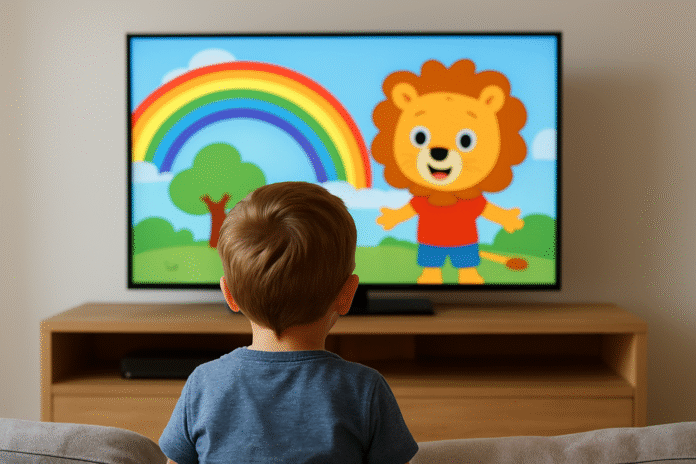Cartoons and Children’s Mental Health: Cartoons have always held a special place in children’s lives. With bright colors, imaginative characters, and entertaining storylines, they easily capture the attention of young minds. At times, cartoons are purely a source of fun, while at other times, they can serve as a valuable tool for learning. However, experts emphasize that the impact of cartoons on children’s mental health depends not only on the type of content they watch but also on how long they spend watching them.
The Benefits of Watching Cartoons
Though often labeled as “just entertainment,” cartoons can provide surprising educational benefits when consumed in moderation.
- Language Development:
Cartoons introduce children to new vocabulary, sentence structures, and expressions. By imitating their favorite characters, kids often learn to communicate more fluently. - Understanding of Colors and Shapes:
The visual appeal of animated shows helps children differentiate between colors, recognize shapes, and observe patterns, boosting their cognitive growth. - Problem-Solving Skills:
Many cartoons present challenges that characters must overcome. As children follow these stories, they learn about problem-solving, teamwork, and decision-making. - Imagination and Creativity:
Cartoons transport children into magical, imaginary worlds. This nurtures creativity, enhances their ability to think beyond boundaries, and sparks curiosity about the world around them. - Love for Stories:
Animated storytelling often serves as a gateway to books and oral narratives. Children who enjoy cartoon stories may develop an early interest in reading.
When Does It Become a Problem?
While cartoons can certainly benefit children, excessive or unregulated screen time can lead to serious concerns. Experts warn that negative effects surface when children spend too long glued to the screen.
- Attention Deficit:
Studies show that watching fast-paced cartoons for more than nine consecutive minutes can impair a child’s ability to concentrate. This affects their performance in school, as well as in outdoor or creative activities. - Delayed Social and Cognitive Skills:
For children between the ages of 2 and 5, too much screen time is linked with delayed language acquisition, poor memory retention, and slower social development. - Imitation of Characters:
Children often copy the behaviors, speech, and gestures of their favorite characters. While sometimes harmless, this can alter their natural behavior and blur the line between reality and fantasy. - Increased Screen Dependence:
Excessive cartoon viewing contributes to higher daily screen time, which can lead to anxiety, introversion, or mood swings. Children may become less interested in outdoor play and face-to-face interactions, relying solely on cartoons for joy and relaxation.
Finding Balance for Healthy Growth
The challenge for parents is not to ban cartoons altogether, but to create a healthy balance that allows children to enjoy the positives without suffering from the negatives. Experts suggest several practical steps:
- Careful Selection of Content:
Not all cartoons are created equal. Parents should choose slow-paced, educational, and age-appropriate shows rather than violent or overly fast-moving ones. - Set Time Limits:
Health professionals recommend that preschool-aged children should not spend more than one hour per day watching cartoons. Older children also benefit from structured limits on screen time. - Encourage Alternative Activities:
Storytelling sessions, art and craft, outdoor games, and social interactions should complement or even replace cartoons. This ensures well-rounded development. - Explain Fantasy vs. Reality:
Parents should regularly engage children in conversations that clarify the difference between the fictional world of cartoons and the real world. - Avoid Using Cartoons as a Pacifier:
Often, parents play cartoons just to keep children calm and occupied. While convenient, this creates long-term dependency and stifles children’s ability to self-regulate emotions.
Expert Insights
Psychologists point out that cartoons stimulate the brain and can encourage learning. However, they warn that when screen time goes unchecked, children’s social skills and intellectual development can be delayed. The effects are particularly pronounced in very young children whose brains are still rapidly developing.
Educators add that the media industry also has a responsibility. By producing more educational and value-based cartoon content, children can benefit not only from entertainment but also from lessons in empathy, cooperation, and creativity.
A Balanced Approach is Key
Cartoons are here to stay. They are a staple of childhood that bring joy, laughter, and sometimes even inspiration. But the key lies in moderation and mindful parenting. Instead of unrestricted access, children need structured guidance that ensures their screen time supports growth rather than hinders it.
To put it simply: cartoons can be a valuable tool for both entertainment and education, but only if consumed in balance. With thoughtful choices and parental involvement, cartoons can enrich a child’s imagination and curiosity—without undermining their mental health or social skills.
Read More: A Natural Spectacle: Costa Rica’s Ostional Beach, Where Thousands of Turtles Nest Together







